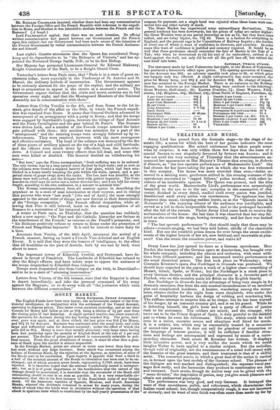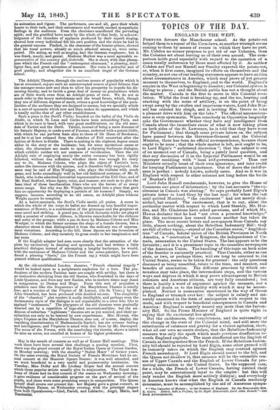Drury Lane has just opened its doors as a German
operahouse. Herr Raeder, the manager of the German opera at Amsterdam, has brought over his whole company, including the chorus and orchestra, with some addi- tions from different quarters; and has announced twelve performances at the usual theatrical prices. The first took place on Wednesday; when Conradin Kreutzer's opera Das Nachtlager in Granada was produced. We should have expected at the outset a work of a higher class—something of Mozart, Gluck, Spohr, or Weber; but the Nachtlager is a stock piece in every German theatre, and the principal character is a favourite part of Pischek, who on this occasion made his debAt on the English boards. Daa Nachtlager in Granada has the advantage of being very simple in its dramatic structure, free from the anti-musical encumbrances of an involved plot and complicated incidents. A hunter, wandering among the moun tains, obtains shelter for the night from some shepherds, who under the guise of hospitality harbour the design of robbing and murdering him. The ruffians attempt to surprise him as he sleeps; but he has been warned of his danger, by an innocent country girl, and is on his.guard. While he is defending himself, the girl's lover and a party of officers of justice rush to his assistance. The robbers are seized; and the stranger, who turns out to be the Prince Regent of Spain, is duly grateful to the faithful pair to whom he owes his deliverance. This story, which could be told even in a ballet, contains scenes and situations well fitted for music. It is a subject, too, which may be successfully treated by a musician of second-rate powers. It does not call for grandeur of conception or the language of intense passion; it will be sufficient if familiar situa- tions and feelings are accompanied and expressed by music of a corre- aponding character. Such music M. Kreutzer has written. It displays little inventive power, and is very unlike the music which we could imagine Weber to have applied to a similar subject. But the melodies, though void of originality, are the reminiscences of a mind well stored with the beauties of the great masters, and their treatment is that of a skilful artist. The concerted music, iu which a great deal of the action is carried on, is formed upon the best models of the German school. The phrases of the dialogue are well marked and distinguished; the separate vocal pas- sages flow easily, and the harmonies they produce in combination are rich and resonant. Such music, though its author may not be gifted with the " wens divinior," the inspiration of genius, may yet give much pleasure and obtain not undeserved popularity. The performance was very good, and very German. It betrayed the want of that smoothness, polish, and refinement, which characterize the Italian vocal school; but, though comparatively rough, it was not incorrect or slovenly, and its want of nice finish was often more than made up for by
its animation and vigour. The performers, one and all, gave their whole hearts to their task, and their earnestness and warmth excited sympathetic feelings in the audience. Even the choristers manifested the pervading spirit; and the gratified bows made•by the whole of that body, in acknow- ledgment of the thunders of applause produced by their superb singing, showed how every individual felt his own position and the share he- had in the general success. Pischek, in the character of the hunter-prince, showed that his vocal powers, already so much admired among us, were unim- paired. His acting, as well assinging, had the German roughness; but it was frank, manly, and genial. Madame Marlow was a most agreeable re- presentative of the country girlo Gabrielle. She is short, with that plump- ness which the French call the " embonpoint charmant," a pleasing, intel- ligent face, and great animation of manner. Her voice is powerful and of good quality, and altogether she is an excellent singer of the German school.



























 Previous page
Previous page